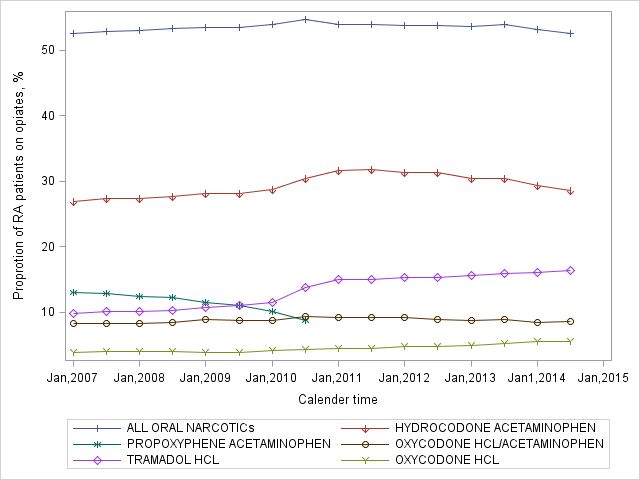Session Information
Session Type: ACR Concurrent Abstract Session
Session Time: 4:30PM-6:00PM
Background/Purpose: Opiate use has come under increasing scrutiny related both to over-use and under-use. The patterns of opiate use over time in a population-based cohort of patients with inflammatory diseases such as rheumatoid arthritis (RA) have not been well characterized. We used health plan data to characterize both trends over time as well as variability in individual physician prescribing of short and long term opiates.
Methods: We used national Medicare data from 2006-2014 and identified a closed cohort of RA patients by requiring two diagnosis codes (ICD9 714.0, 714.2, 714.81) from rheumatologists separated by 7 days. To be included in the analysis, patients must have at least 6 consecutive observable months (enrolled in Medicare Part A, Part B and Part D coverage, not enrolled in Part C) prior to 1/1/2007. Follow up started at 1/1/2007 and end at the earliest of: dis-enrollment, 90 days before death, or end of study (12/31/2014). Any oral opiates use (one or more filled prescriptions) was assessed every six months for patients who remained under follow-up over the entirety of each 6 month interval. Generalized estimating equations with repeated measure was used to calculate odds ratios for the receipt of opiates in each 6 month interval. A separate cohort was created using 2014 Medicare data to assess the variability in prescribing opiates among rheumatologists for their RA patients (assigned based on at least one physician encounter in 2014 with an RA diagnosis code). We restricted this analysis to rheumatologists with at least 10 RA patients enrolled in Medicare for the entire year. The proportion of RA patients using opiates was calculated by dividing RA patients with at least two opiate prescriptions in 2014 by the total number of RA patients treated by each U.S. rheumatologist.
Results: For the longitudinal analysis, we identified 73,834 RA patients meeting eligibility criteria. Patient characteristics were (mean age 67.6 (12.2), 80.0% Female, 80.1% White, 12.3% Black). In 2006, the most commonly used opiates were medications that combined acetaminophen with hydrocodone or with propoxyphene (withdrawn from U.S. in 2010). Over 2006-2014, trends (Figure) showed overall opiate use increased slowly but significantly and reach a peak in 2010, and decreased thereafter. Following the withdrawal of propoxyphene in 2010, use of hydrocodone and tramadol increased commensurately such that overall opiate use declined only slightly. Factors associated with opiate use included younger age, female, white race, disability, lower income and baseline NSAID use. In 2014, practice-level variability between U.S. rheumatologists (n=4,900) in the use of opiates for their RA patients was high. In rheumatology practices at the 50th percentile, 46% of RA patients used opiates. The proportion of patients using opiates at the 25th and 75th percentiles was 37% and 55%, respectively. At the extremes (1st and 99th percentile), 0-92% of RA patients within each rheumatologist’s practice were treated with opiates. However, among all patients in the analysis, only 43% of RA patients had any of their opiate prescriptions written by a rheumatologist.
Conclusion: In the US, opiate use peaked in RA patients in 2010 and is now undergoing slight declines. There was substantial variability between rheumatologists in the proportion of their RA patients using opiates, although fewer than half of patients had their opiate prescriptions written by rheumatologists. Withdrawal of the 2nd most commonly used opiate (propoxyphene) from the U.S. market in 2010 had minimal effect on overall use, as it was replaced with greater use of other opiates. 
To cite this abstract in AMA style:
Curtis J, Xie F, Saag K, Chen L, Beukelman T, Mannion M, Yun H. Changing Patterns over Time in Opiate Use in U.S. Rheumatoid Arthritis Patients [abstract]. Arthritis Rheumatol. 2016; 68 (suppl 10). https://acrabstracts.org/abstract/changing-patterns-over-time-in-opiate-use-in-u-s-rheumatoid-arthritis-patients/. Accessed .« Back to 2016 ACR/ARHP Annual Meeting
ACR Meeting Abstracts - https://acrabstracts.org/abstract/changing-patterns-over-time-in-opiate-use-in-u-s-rheumatoid-arthritis-patients/
